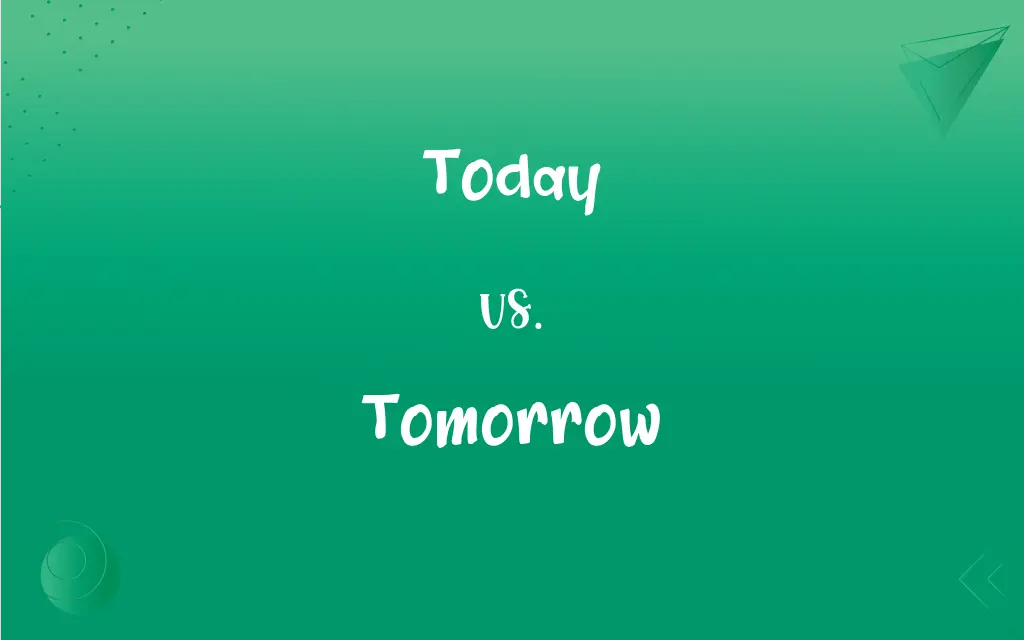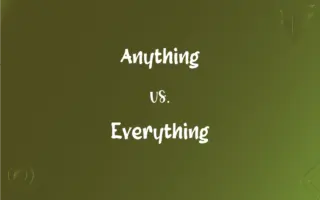Today vs. Tomorrow: What's the Difference?
Edited by Aimie Carlson || By Janet White || Published on January 10, 2024
'Today' refers to the current day, the present time, whereas 'tomorrow' indicates the day following today, focusing on future events or plans.

Key Differences
'Today' is used to denote the present day, encompassing all events, tasks, or experiences that occur within this 24-hour period. In contrast, 'tomorrow' refers to the day that comes immediately after today, signifying a future time frame.
In terms of planning and schedules, tasks or appointments set for 'today' are expected to be addressed or occur within the current day. Meanwhile, 'tomorrow' is used for scheduling or anticipating events that are planned for the next day.
'Today' is often associated with immediate action, current events, or the state of things as they are now. On the other hand, 'tomorrow' can imply anticipation, future possibilities, or the need for preparation for what is to come.
The concept of 'today' is linked with the present moment and immediate realities, focusing on the here and now. Conversely, 'tomorrow' conveys a sense of the near future, often with an implication of hope, expectation, or potential change.
'Today' can symbolize the urgency or importance of the present, emphasizing the need to act or make decisions now. In contrast, 'tomorrow' might suggest delay, procrastination, or the opportunity for change and improvement in the future.
ADVERTISEMENT
Comparison Chart
Time Reference
Current day, present time
Day following the current day, future time
Planning and Scheduling
Tasks or events expected to occur within the same day
Planning for events or tasks for the next day
Contextual Use
Immediate action, current state of affairs
Anticipation, future possibilities
Symbolism
Urgency, importance of the present
Hope, potential for change, procrastination
Temporal Focus
Here and now, present moment
Near future, coming day
ADVERTISEMENT
Today and Tomorrow Definitions
Today
The present day or the time at which something is happening.
I have a meeting scheduled for today.
Tomorrow
Used to indicate future events or plans.
Our guests are arriving tomorrow.
Today
Used to emphasize immediacy or importance in the present.
We need to finish this project today.
Tomorrow
Symbolizing future possibilities or potential.
Tomorrow holds new opportunities.
Today
Indicating the present period in history or life.
Technology today is advancing rapidly.
Tomorrow
The day after today; the immediate future.
I will start my new diet tomorrow.
Today
Referring to the current state of affairs or conditions.
Today, the weather is particularly sunny.
Tomorrow
Referring to the near future or coming time.
The forecast predicts rain for tomorrow.
Today
The day on which the speaker is speaking or writing.
Today, I decided to start a new hobby.
Tomorrow
A time to signify procrastination or delay.
I'll do the laundry tomorrow.
Today
The present day, time, or age
"Today's shocks are tomorrow's conventions" (Carolyn Heilbrun).
Tomorrow
The day following today.
Tomorrow
The future.
FAQs
Can 'today' be used to emphasize urgency?
Yes, it often implies immediate action or attention.
Can 'today' be used in a metaphorical sense?
Yes, to represent current trends or conditions.
What does 'tomorrow' indicate in terms of time?
It refers to the day after the current one.
What does 'today' represent in a calendar?
It marks the current date on the calendar.
Is 'tomorrow' used in planning and scheduling?
Frequently, for organizing future events or tasks.
Does 'today' have different meanings in different cultures?
It can, based on cultural perceptions of time and daily life.
How does 'tomorrow' relate to business planning?
It's used for scheduling future meetings, deadlines, or objectives.
Does 'today' always refer to a 24-hour period?
Generally, it refers to the daylight hours of the current day.
Does 'tomorrow' imply a specific time of day?
It usually encompasses the entire next day.
Is 'today' used in historical contexts?
Yes, to denote the present era or time.
Can 'tomorrow' signify something beyond the literal next day?
Yes, it can symbolize the future or upcoming times.
Can 'tomorrow' be used metaphorically?
Yes, to represent future possibilities or hopes.
How is 'today' used in casual conversation?
Often to discuss current events or personal plans.
How do news reports use 'today'?
Typically, to reference events happening on the current day.
Can 'tomorrow' reflect uncertainty?
Yes, when referencing unknown or unpredictable future events.
Can 'tomorrow' be a theme in literature?
Yes, often symbolizing hope, future, or change.
How do digital calendars use 'today'?
They often highlight 'today' to distinguish the current date.
Can 'today' be used in motivational contexts?
Yes, to encourage immediate action or change.
Can 'tomorrow' be used to indicate procrastination?
Yes, often in the context of delaying tasks or decisions.
Is 'today' a term used in scientific contexts?
Yes, especially in discussions about current research or findings.
About Author
Written by
Janet WhiteJanet White has been an esteemed writer and blogger for Difference Wiki. Holding a Master's degree in Science and Medical Journalism from the prestigious Boston University, she has consistently demonstrated her expertise and passion for her field. When she's not immersed in her work, Janet relishes her time exercising, delving into a good book, and cherishing moments with friends and family.
Edited by
Aimie CarlsonAimie Carlson, holding a master's degree in English literature, is a fervent English language enthusiast. She lends her writing talents to Difference Wiki, a prominent website that specializes in comparisons, offering readers insightful analyses that both captivate and inform.








































































